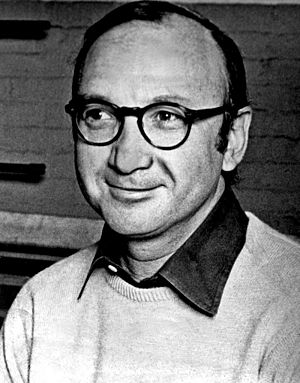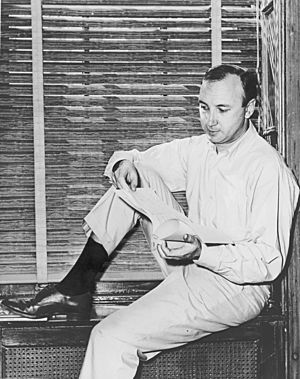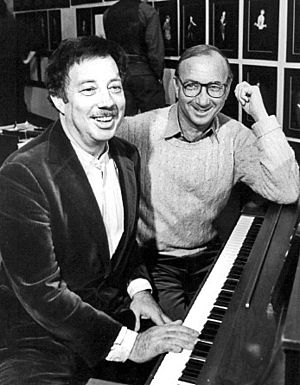Neil Simon facts for kids
Quick facts for kids
Neil Simon
|
|
|---|---|

Simon in 1974
|
|
| Born | Marvin Neil Simon July 4, 1927 The Bronx, New York City, U.S. |
| Died | August 26, 2018 (aged 91) Manhattan, New York City, U.S. |
| Occupation |
|
| Alma mater | |
| Period | 1948–2010 |
| Genre |
|
| Notable works |
|
| Notable awards | Pulitzer Prize for Drama (1991) |
| Spouse |
Joan Baim
(m. 1953; died 1973)Diane Lander
(m. 1987; div. 1988)
(m. 1990; div. 1998)Elaine Joyce
(m. 1999) |
| Children | 3 |
| Relatives |
|
Marvin Neil Simon (born July 4, 1927 – died August 26, 2018) was a famous American writer. He wrote many plays for the stage, movie scripts, and books. He created over 30 plays and almost as many movie screenplays. Most of his movies were based on his own plays.
Neil Simon won many important awards for his work. These include three Tony Awards, a Golden Globe Award, and a Pulitzer Prize. He also received a special Tony Award in 1975. In 1995, he was honored at the Kennedy Center. In 2006, he won the Mark Twain Prize for American Humor.
Simon grew up in New York City during a tough time called the Great Depression. His parents had money problems, which made his childhood difficult. He often found comfort by watching funny movies with stars like Charlie Chaplin. After high school and serving in the Army Air Force Reserve, he started writing comedy. He wrote for radio shows and popular early TV shows. These included Sid Caesar's Your Show of Shows and The Phil Silvers Show.
His first play, Come Blow Your Horn, opened in 1961. It took him three years to finish. The play was very popular and ran for 678 shows on Broadway. After that, he had two more big hits: Barefoot in the Park (1963) and The Odd Couple (1965). He won a Tony Award for The Odd Couple. This made him a national star and a very popular writer on Broadway.
From the 1960s to the 1980s, Neil Simon wrote for both the stage and movies. His writing style included funny plays (farces), romantic comedies, and more serious comedies. He received 17 Tony nominations in total and won three awards. In 1966, he had four successful plays running on Broadway at the same time. In 1983, a New York theater was named after him, the Neil Simon Theatre. He was the only living playwright at the time to have this honor.
Contents
Early Life and Inspiration
Neil Simon was born on July 4, 1927, in The Bronx, New York City. His parents were Jewish. His father, Irving Simon, sold clothes. His mother, Mamie Simon, stayed home to care for the family. Neil had an older brother, Danny Simon, who also became a TV writer. Neil grew up in Washington Heights, Manhattan. He finished high school at DeWitt Clinton High School when he was sixteen. People called him 'Doc', and his school yearbook said he was very shy.
Simon's childhood was affected by his parents' arguments and money problems. Sometimes, he would put a pillow over his ears to block out their fights. His father would often leave the family for months. This caused more money and emotional problems. Because of this, the family sometimes had people living with them. Neil and his brother Danny sometimes had to live with other relatives.
Neil Simon once said that he never really understood why his parents fought so much. He said his mother would get very angry but always take his father back because she loved him. Simon felt that he needed to be independent from these family issues. He realized this when he was about seven or eight years old. He felt he had to start taking care of himself. This made him a strong and independent person.
He found comfort and inspiration at the movies. He loved watching stars like Charlie Chaplin, Buster Keaton, and Laurel and Hardy. Simon said he was often told to leave movies because he laughed too loudly. These childhood films inspired him. He wanted to make entire audiences laugh so hard they would fall over. He decided that writing comedy would be his goal. He also saw it as a way to connect with people. He knew he would not be an athlete or a doctor.
Simon started writing for money while still in high school. At age fifteen, he and his brother wrote funny skits for a department store event. To improve his writing, he spent three days a week at the library. He read books by famous humor writers like Mark Twain and George S. Kaufman.
After high school, he joined the Army Air Force Reserve at New York University. He became a corporal and was sent to Colorado. During his time in the Reserve, Simon wrote professionally. He started as a sports editor. He was at Lowry Air Force Base in 1945. He also went to the University of Denver from 1945 to 1946.
A Career in Writing
Writing for Television
Neil Simon left his job as a mailroom clerk at Warner Brothers in Manhattan. He wanted to write radio and TV scripts with his brother, Danny Simon. They learned from a radio humorist named Goodman Ace. Their work for The Robert Q. Lewis Show on radio led to more writing jobs. Max Liebman hired them for his popular TV comedy show, Your Show of Shows. This program was nominated for Emmy Awards for Best Variety Show several times. It won in 1952 and 1953. Simon later wrote scripts for The Phil Silvers Show in 1958 and 1959.
Simon later said these two TV jobs were very important for his career. He spent five years on them and learned a lot about writing. He felt that Your Show of Shows had the most talented group of writers ever. Simon used some of these experiences in his play Laughter on the 23rd Floor (1993). A TV version of this play in 2001 earned him two Emmy Award nominations.
Writing for the Stage
Simon's first experience on Broadway was with Catch a Star! in 1955. He worked with his brother Danny on some comedy sketches for it.
In 1961, Simon's first Broadway play, Come Blow Your Horn, opened. It played for 678 performances at the Brooks Atkinson Theatre. Simon spent three years writing this first play. He also worked on TV scripts at the same time. He rewrote the play at least twenty times. He said he lacked belief in himself and felt it wasn't good enough. This effort was a big turning point in his career. He felt that the theater and he found each other.
Barefoot in the Park (1963) and The Odd Couple (1965) made him nationally famous. He won a Tony Award for The Odd Couple. People called him "the hottest new playwright on Broadway." Many more successes followed. In 1966, Simon had four shows playing on Broadway at the same time. These included Sweet Charity, The Star-Spangled Girl, The Odd Couple, and Barefoot in the Park. These plays earned him a lot of money.
His work included romantic comedies and serious dramas. Overall, he received seventeen Tony nominations and won three awards. Simon also adapted stories from other works. For example, he turned the film Nights of Cabiria into the musical Sweet Charity. By 1969, Simon was earning a lot of money from his shows. This made him the most financially successful Broadway writer ever.
Simon often used his own life experiences in his stories. His plays are usually set in working-class New York City neighborhoods. These were similar to where he grew up. In 1983, he started writing three plays about his own life. These were Brighton Beach Memoirs (1983), Biloxi Blues (1985), and Broadway Bound (1986). Critics praised this group of plays very highly. He won a Pulitzer Prize for his next play, Lost in Yonkers (1991). This play was a big success on Broadway.
After Lost in Yonkers, some of Simon's plays were not as successful. The Dinner Party (2000) was a small hit. Simon's last play, Rose's Dilemma, opened in 2003. It did not get good reviews. Neil Simon is credited as a writer for at least 49 Broadway plays.
Writing for Movies
Simon chose not to write the movie script for his first play, Come Blow Your Horn (1963). He wanted to focus on writing more plays. However, he was not happy with the movie. After that, he tried to control how his plays were turned into films. Simon wrote screenplays for more than twenty movies. He was nominated for four Academy Awards. These were for The Odd Couple (1969), The Sunshine Boys (1975), The Goodbye Girl (1977), and California Suite (1978). Other movies he wrote include The Out-of-Towners (1970) and Murder by Death (1976).
Many of his early movie adaptations were very similar to the original plays. Simon later said he wasn't very interested in films back then. He mainly wanted to keep writing for the theater. He felt his plays never really became "cinematic" (like a movie). The Odd Couple (1968) was a very successful early movie version. It stayed true to the play but also added more scenes and locations.
Simon's Writing Style
The most important part of Simon's writing was comedy. He used funny situations and jokes. He often wrote about serious topics in a way that made people laugh to avoid crying. He did this with quick jokes and witty remarks. His stories were set in many different city places. This created a "sophisticated, urban humor." His plays often showed "middle America." Simon created everyday, simple problems that became funny situations needing solutions.
Another part of his writing style was his focus on family. Many of his stories showed the importance of marriage and family. Some critics thought his stories were a bit old-fashioned. But many audience members liked that Simon supported their own beliefs.
Simon was also good at mixing comedy and drama. For example, Barefoot in the Park is a light romantic comedy. Parts of Plaza Suite were very silly (farce). Parts of California Suite were "high comedy" (witty and clever).
Simon liked to try new things and take risks. He often moved his plays in new directions. In The Gingerbread Lady, he mixed comedy with sadness. Rumors (1988) was a full-length farce. In Jake's Women and Brighton Beach Memoirs, he used a narrator to tell parts of the story. In The Good Doctor, he created short sketches based on stories by Chekhov. Even if some of these plays didn't get great reviews, they showed that Simon was a serious writer who wanted to try new things.
Characters in His Plays
Simon's characters are usually "imperfect, unheroic figures who are at heart decent human beings." This means they are normal people with flaws, but they are good inside. His comedy style is similar to that of Menander, an ancient Greek playwright. Like Simon, Menander also used everyday people in home settings. He also mixed humor and sadness in his stories. Many of Simon's best plays have scenes with just two characters.
Before writing, Simon tried to imagine his characters clearly. He said that Star Spangled Girl, which was not a hit, was the only play where he didn't have a clear picture of the characters. Simon felt it was his job to create strong characters. Other writers have created memorable characters, but not as many as Simon did. One writer said Simon had no equals among comedy playwrights of his time.
Simon's characters often make the audience laugh with clever jokes. Simon was very skilled at writing dialogue, which made his characters believable. Audiences could easily relate to them and laugh at them. His characters also talked about "serious and continuing concerns of mankind." They were impatient with fake people, shallow ideas, and bad morals. They sometimes criticized modern city life with its stress and focus on money. However, Simon's characters never openly rebelled against society.
Themes and Stories
Theater critic John Lahr believed Simon's main theme was about "the silent majority." These were often people who felt frustrated, nervous, and unsure of themselves. Simon's characters are "likable" and easy for audiences to connect with. They often have difficult relationships in marriage, friendship, or business. They "struggle to find a sense of belonging." According to writer Edythe McGovern, Simon's plays always show people trying to solve problems through relationships with others. She said Simon could deal with serious topics that everyone cares about, while still making people laugh.
McGovern also said that Simon had "great compassion for his fellow human beings." Author Alan Cooper agreed, saying Simon's plays "are essentially about friendships, even when they are about marriage or siblings or crazy aunts."
Many of Simon's plays are set in New York City. This gives them a city feel. Within this setting, Simon's themes include arguments in marriage, sibling rivalry, growing up, sadness from loss, and fear of getting old. Even with these serious ideas, Simon always told his stories with humor. He mixed real-life situations with comedy. Simon would tell new comedy writers not to try to make it funny. Instead, he advised them to make it real, and then the comedy would come naturally.
He said that when he wrote plays, he was almost always writing a drama that was funny. He wanted to tell a story about real people. His comedies often showed struggles with marriage problems or love fading. This sometimes led to separation, divorce, and child custody issues. After many plot twists, the endings usually showed the relationships getting better.
Politics rarely appeared in Simon's stories. His characters avoided challenging society as a whole, despite their personal problems. Drama critic Richard Eder noted that Simon's popularity came from his ability to show "painful comedy." This is where characters say and do funny things, even when they are feeling unhappy.
Simon's plays were often based on his own life. They showed parts of his difficult childhood and his first marriages. His plays often showed the lives of white middle-class Americans, many of whom were New Yorkers and Jewish, like him. He once said, "I suppose you could practically trace my life through my plays." In Lost in Yonkers, Simon showed how important a loving marriage is. He suggested that children who don't have this at home can end up emotionally hurt and lost.
Simon's Jewish background was a key influence on his work, even if he didn't realize it while writing. For example, in the Brighton Beach plays, the main character often makes fun of himself and his Jewish culture. Simon said his characters are often self-critical and usually see life from a tough point of view. He explained, "I see humor in even the grimmest of situations." He believed it was possible to write a play so moving it could make you cry, but still have humor in it. This idea, notes Koprince, is part of a tradition of Jewish humor. This tradition sees laughter as a way to cope and as a healing force.
Personal Life
Neil Simon was married five times. For 20 years (1953–1973), he was married to Joan Baim, a dancer. They had two daughters, Nancy and Ellen. In 1973, Joan died from bone cancer at age 41. Ellen was 16 and Nancy was 10 at the time. Simon then married actress Marsha Mason (1973–1983). After they divorced, he married actress Diane Lander two separate times (1987–1988 and 1990–1998). He adopted Bryn, Diane's daughter from a previous relationship. His last marriage was to actress Elaine Joyce in 1999. They were married until his death.
Simon's nephew is U.S. District Judge Michael H. Simon. His niece-in-law is U.S. Congresswoman Suzanne Bonamici.
In 2004, Simon received a kidney transplant from his friend and publicist, Bill Evans.
Neil Simon passed away from pneumonia on August 26, 2018, in Manhattan. He was 91 years old. He was in the hospital for kidney failure and also had Alzheimer's disease.
Awards and Honors
Neil Simon received three honorary degrees from different universities. In 1983, he became the only living playwright to have a New York City theater named after him. The Alvin Theatre on Broadway was renamed the Neil Simon Theatre in his honor. He was also an honorary board member of the Walnut Street Theatre in Philadelphia, which is America's oldest theater. Also in 1983, Simon was added to the American Theater Hall of Fame.
In 1965, he won the Tony Award for Best Play for The Odd Couple. In 1975, he received a special Tony Award for his overall contributions to American theater. Simon won the 1978 Golden Globe Award for Best Motion Picture Screenplay for The Goodbye Girl. For Brighton Beach Memoirs (1983), he won the New York Drama Critics' Circle Award. He then won another Tony Award for Best Play in 1985 for Biloxi Blues. In 1991, he won both the Pulitzer Prize and a Tony Award for Lost in Yonkers.
The Neil Simon Festival is a professional summer theater. It works to keep the plays of Simon and other writers of his time alive. Richard Dean Bugg started the Neil Simon Festival in 2003.
In 2006, Simon received the Mark Twain Prize for American Humor.
Images for kids
Error: no page names specified (help). In Spanish: Neil Simon para niños
In Spanish: Neil Simon para niños
 | William L. Dawson |
 | W. E. B. Du Bois |
 | Harry Belafonte |






